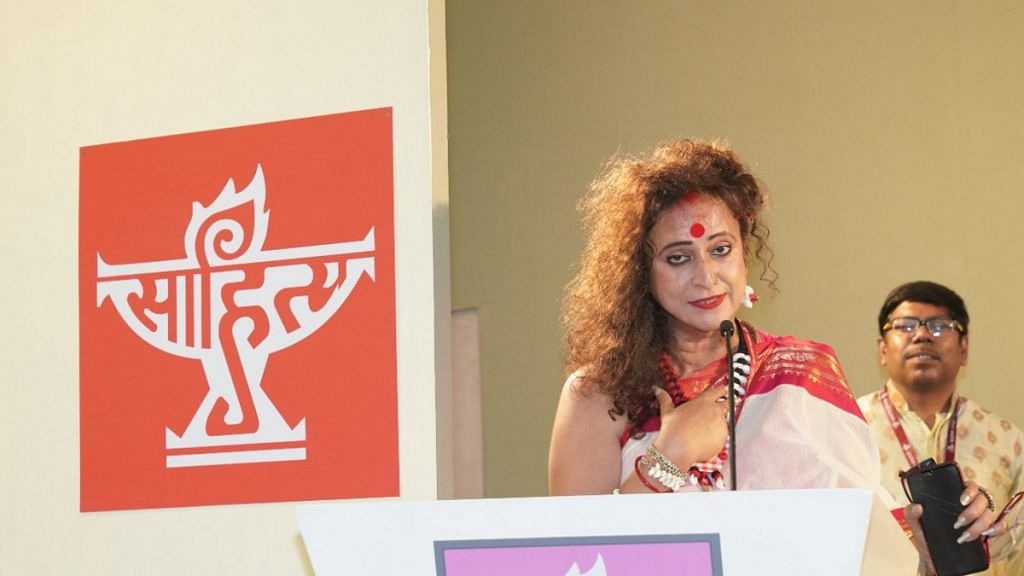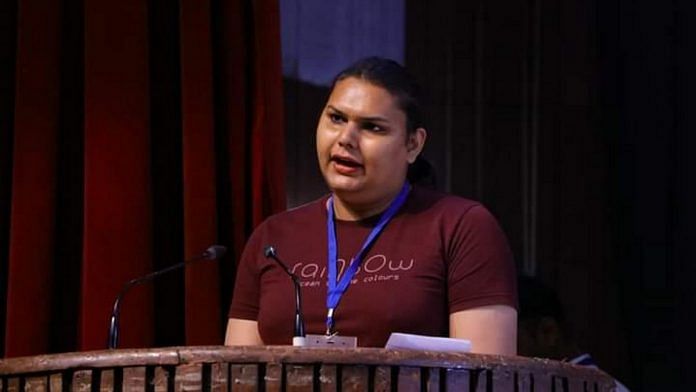New Delhi: The classroom is not usually a problem, but the staffroom often is. This is the refrain of several trans and gender non-conforming teachers who are struggling to work with dignity in schools across India.
“Why do you dress like a man? When will you get married? Why were you at a pride parade?” These are just some of the questions that 32-year-old English and theatre teacher Koel Ghosh has had to field from colleagues at elite private schools in Kolkata.
Ghosh, whose preferred pronoun is they/them, identifies as non-binary and transmasculine. They were assigned female at birth, but their gender expression is masculine.
In a career spanning seven years, Ghosh has worked at five schools, but has found it difficult to stay for long because of the insensitivity of their peers. At one point, Ghosh said, they faced a tough choice from school authorities: wear a sari on events like Independence Day celebrations or resign. Ghosh resigned.
Earlier this month, social sciences teacher Jane Kaushik, a 29-year-old transgender woman, claimed in a social media video that she had been forced to resign from a school in Uttar Pradesh’s Lakhimpur Kheri because of her gender identity. She had been in the position for just a week or so.
“I was qualified for the position, the school conducted a thorough check, and then hired me on the condition that I do not reveal my identity,” Kaushik told ThePrint.
She needed a job, so she accepted the stifling condition. However, she was soon “outed”.
“I am a 6 ft-tall woman with broad shoulders. I can wear a sari, and dress conventionally, but how do I change my body?” she asked.
Kaushik alleged that not only did she hear students pejoratively calling her a hijra, but also a male teacher asking female boarding students about her “behaviour” in the hostel.
She claimed that she tried to reason with the students, told them that she was from a “minority” community and that there were laws to help people like her. But she despaired at the adults around her. “Only aware students can make for aware adults, but if adults keep promoting stigma how will the attitudes of the children change?” she said. “Being a trans person is hard in itself. With such brutal scrutiny even in educated spaces, how are we expected to function normally?”
Last week, the National Commission for Women (NCW) asked the Uttar Pradesh chief secretary to probe Kaushik’s allegation of gender discrimination. The school authorities, meanwhile, have claimed that she was fired because of “incompetence”.
Kaushik is now not only seeking to be re-hired but for the school to apologise and conduct gender-sensitisation workshops.
The irony is that teachers like Ghosh and Kaushik, despite their considerable challenges, are relatively “privileged”. They speak English, are highly educated, and have been able to make it through the hiring rounds of private schools.
The barriers are even higher in government schools, although this year Karnataka became the first state to institute one per cent reservation for trans candidates. Three teachers from the community were recruited in November from among 10 applicants.
However, when ThePrint spoke to a range of private and government schools in Delhi, none of them had any trans teachers and nor did they have any awareness regarding legal provisions that call for equal opportunity employment as well as infrastructural facilities for trans workers.
Also read: ‘She’s not always a woman to me’: Court cases on ‘gender-deception’ highlight true cost of stigma
Bittersweet ‘success’
When Manabi Bandyopadhyay, PhD, was appointed as the principal of West Bengal’s Krishnagar Women’s College in 2015, she was celebrated as the first transgender woman in India to have made it so high up the ladder in an institute of higher learning.
However, this wasn’t the end of her struggles. Bandyopadhyay told ThePrint she resigned from the position in 2016 after the staff and students turned against her and held “gheraos” because, she felt, “they could not accept a trans person in a position of authority”.
However, the then education minister of state Partha Chatterjee had refused to accept her resignation and she had resumed her duties as principal. She was later transferred to Dhola Mahavidyalaya, Calcutta University, in 2019. Even that move created controversy as the government order identified her as a ‘male’.
Even now, true acceptance continues to elude Bandyopadhyay.
“The covert microaggressions have traumatised me over the years in such a manner that I feel there’s absolutely no means to sensitise people,” she said. “On the surface, society may have accepted us, but they subconsciously keep rejecting us at every single step.”

Many workplaces, and not just schools or colleges, also throw up practical problems for trans people.
Teacher Koel Ghosh is also the managing trustee for Sappho for Equality, an organisation working for the rights of trans people and other sexually marginalised groups.
As a collective, the organisation is trying to find agencies that will help queer and trans people get jobs. Among the many things that they are trying to raise awareness about is the need for gender neutral toilets/washrooms.
“We have had cases where queer people have worked 12 hours straight without using the toilet,” Ghosh said.
In addition to this, many trans people are misgendered at their place of work. This could range from their preferred pronouns being ignored to their “dead name” being used. A dead name refers to a gendered name given at birth that a trans person no longer identifies with.
Teaching can be especially challenging since it involves numerous interactions and scrutiny.
This is one of the reasons why a 32-year-old trans man who grew up in Punjab decided to let his B.Ed. degree languish.
Speaking to ThePrint under condition of anonymity, he said he had always aspired to be a teacher, but was held back by fear of discrimination.
“I wanted to be able to sustain myself and get a job. I knew no school would hire me if I came out. Even after I changed my stream and joined a bank I knew I would become an outcast the minute I came out,” he said.
After years of trying to hide his identity, he finally came out in 2020 after he lost his banking job due the pandemic.
Laws have changed, but society hasn’t kept up
Members of the LGBTQI+ community that ThePrint spoke to said they are fighting for greater action as well as more stringent legal protections against workplace discrimination.
However, some gains have been made in this regard. In 2014, the Supreme Court recognised trans people as a “third gender” in a landmark ruling and asked the government to put in place policies to protect their rights.
This was finally crystallised in the form of a law in 2019, when the Transgender Persons (Protection of Rights) Act was passed. While it prohibited discrimination in education, work, healthcare, and so on, it received some criticism for the terminology used and for not adequately addressing barriers to employment and healthcare.
Another important development was the Support for Marginalized Individuals for Livelihood and Enterprise (SMILE) scheme, started by the central government’s Ministry of Social Justice and Empowerment in February this year. A section of this scheme focuses on the welfare of transgender people in areas like provision of healthcare, education and skill development.
Tinesh Chopade, advocacy manager at Mumbai-based Humsafar Trust, an NGO that works for LGBTQI+ rights, said that the new law and the SMILE scheme are welcome changes, but that the odds are still stacked against trans people.
When it comes to employment, he added, many trans people struggle to break out of their ‘traditional’ occupations of sex work and begging.
“Getting a qualifying degree is the biggest challenge that transgender and queer children face. The other major problem for them is getting the correct documentation. The process is long and tedious and most of them are not educated enough to figure out the process,” Chopade said.
Data about the transgender community is thin in India, and perhaps even more so considering the lack of clarity about definitional terms like transgender, intersex, non-binary and so on.
According to the 2011 census, India has 4.87 lakh trans citizens.
A 2017 survey on transgender rights commissioned by the National Human Rights Commission (NHRC) found that as many as 92 per cent of trans people in India are deprived of economic opportunities in India and as many as 96 per cent eke their living by begging or sex work. Most drop out of school.
Even those who are educated and seek mainstream work have to cross huge hurdles, Chopade explained.
A part of his job is to train members of the LGBTQI+ community and also to reach out to corporations to seek opportunities. While some companies are willing to employ trans people, their requirements can be unrealistic, he said.
“Sometimes they will contact us and ask for a trans person with five-seven years of work experience. How will a trans person have that kind of experience? [Companies] eliminate the space for them at entry levels,” he said.
“At times like these, we push our existing candidates for these jobs. A sex worker bargains to earn a decent living. We help her polish that skill and push her for sales roles. We try to market our upskilled personnel over those with work experience,” he added.
However, societal attitudes still haven’t kept up with the writ of the law.
For instance, the Kerala government hired 21 transgender staff for its Kochi metro in 2017 with a lot of fanfare. However, nine of these workers resigned within a month. The reason was that no homeowner in the area was willing to rent them accommodation.
Then there is the case of Adam Harry, India’s first trans pilot. He was declared as unfit to fly by the Directorate General of Civil Aviation (DGCA) because he was on hormone treatment that will continue for life. Harry is now working as a delivery person for Zomato.
In September this year, the Supreme Court ordered the government to come up with a policy that would open up job avenues for trans persons within three months. The order came in the wake of a petition filed by a trans woman Shanavi Ponnusamy who claimed that she had been rejected as a cabin crew member because of her gender identity.
The court noted that India’s transgender law was a “watershed moment” but it needed to be complied with “in letter and spirit”.
(Edited by Asavari Singh)
Also read: Chennai transgender groups are living their Bharatnatyam dream—for respect, dignity, livelihood



